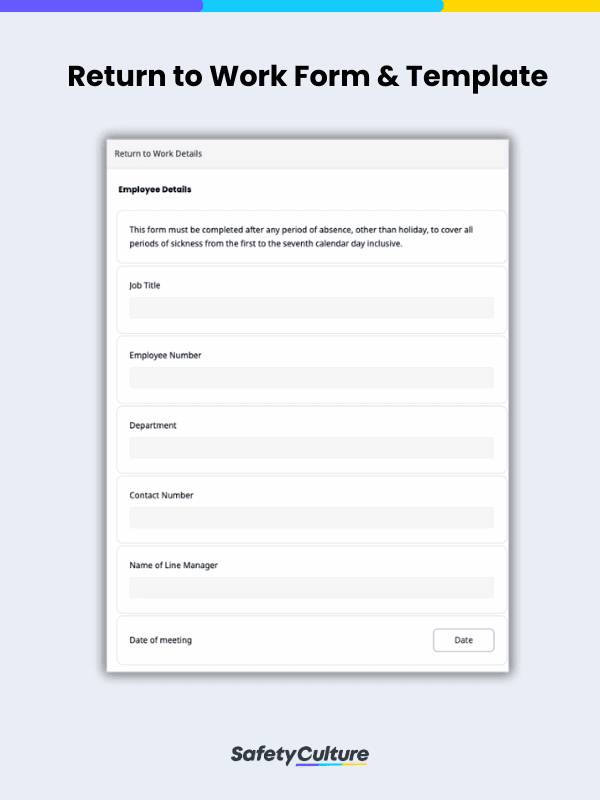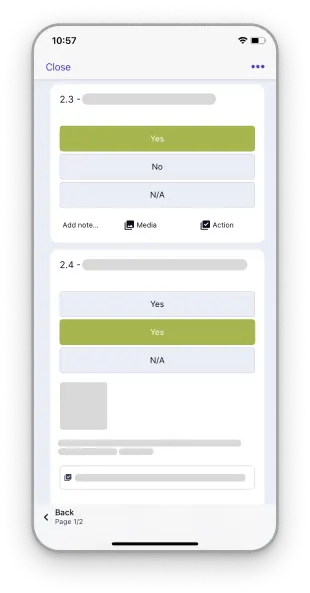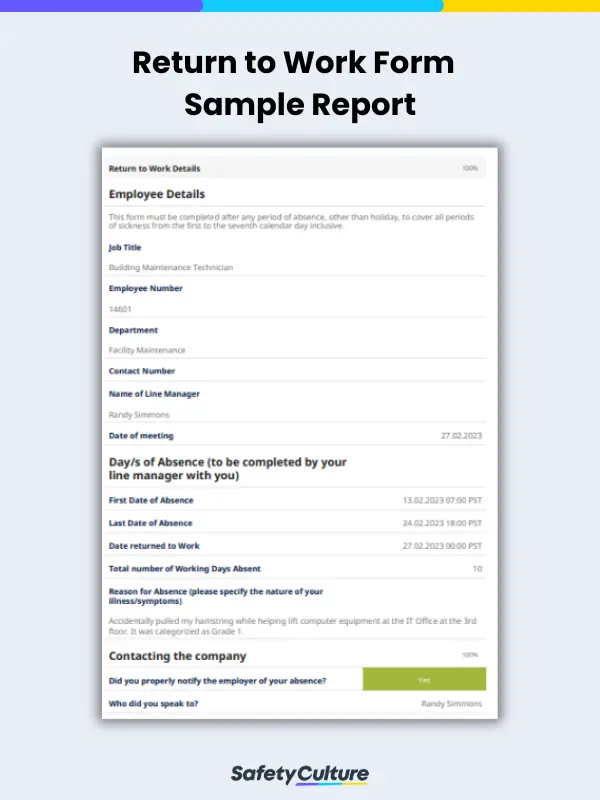What is a Return to Work Form?
A return to work form is used to document information about employees coming from a prolonged period of absence (e.g. due to injury or sickness) and their ability to return to work and fulfill their job duties. It is either used for self-certification or as a tool during return to work interviews. During the return to work interview, employees complete their form with their manager, and, together, they outline how the employee could be reintegrated back into the workforce as seamlessly as possible.
What is in a Return to Work Form?
Within the return to work form, managers and employees will need to typically provide details relating to their absence, such as:
- the duration of absence;
- the method used by employees to notify of their absence;
- the reason for absence;
- details about previous absences over the past calendar year (if applicable);
- a summary of the return to work plan; and
- reasonable adjustments/accommodations necessary to help the employee go back to work safely
Why is it Important to Go Through the Return to Work Form?
While filling out a return to work form is not legally required in the U.S. and U.K, it is a vital tool for companies to understand employees, identify any patterns in absences, and determine ways how to support them and reduce absenteeism in the long run. Additionally, going through return to work forms help:
- discourage unauthorized and non-genuine absences;
- confirm the accuracy of an employee’s absence record;
- inform employees about the necessary updates that have been taken during their absence;
- identify any workplace adjustments that may be needed to help the employee adjust during the reintegration; and
- develop, discuss, and agree on a Return to Work Plan.
Employers may decide to make return to work forms and interviews as requirements of their return to work program to help them ensure proper documentation of the processes.
What is a Return to Work Interview?
A return to work interview is a brief meeting between an employee and the manager on the former’s return to work after an absence. This discussion serves as the manager’s acknowledgment of the employee’s intention to return to work and the method to determine the most suitable return to work plan for the employee.
How to Facilitate an Effective Return to Work Interview
To carry out an effective return to work interview, managers should consider the following:
Before the Interview
- It would be beneficial to review the employee’s attendance record over the year and the return to work interview notes attached (if applicable). This will allow the manager to have a better foundation of how to support the employee when making the return to work plan.
- Use a return to work interview form template as a guide for structuring the interview, but make sure to maintain a two-way communication throughout the process.
- Choose a meeting space where the employee will feel comfortable.
During the Interview
- Be clear that the purpose of the meeting is to provide support to the individual in his/her return to work.
- Discuss with the employee the notes from their previous return to work interviews and establish what help the employee is currently receiving.
- Discuss the cause(s) of absence and the likelihood of the illness recurring and give the employee the opportunity to highlight any relevant issues.
- Probe if there are any personal or work-related concerns that might affect their attendance. If there are personal issues, discuss whether there are any support mechanisms/actions that the employee or the manager may reasonably take to seek to alleviate the problems, (e.g., access to counseling, staff helpline, etc.). If the problems are work-related. If absences relate to disability, pregnancy, or a work-related accident, undertake a return to work risk assessment.
- Establish if any ‘reasonable adjustments’ are required to their role or work environment.
- Remind the employee of the mutual obligations – i.e. that it is the individual’s responsibility/contractual obligation to attend work, and the employer/manager has a corresponding responsibility and concern for the employee’s wellbeing.
After the Interview
- Both parties should sign the return to work form once the action plan has been agreed upon. This information should remain completely confidential.
- If appropriate agree on a review period and/or any actions required.
- Make sure to identify specific actions and inform responsible task owners.
- Be available to talk to/meet with the employee, should they have any issues following the RTW.
Employee Return to Work Form Example
Here’s a filled-out example that shows what an employee return to work form report looks like:




